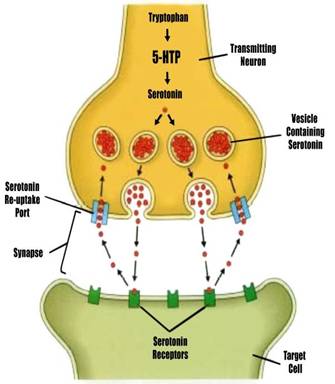What are SSRIs? - SSRIs are a class of drugs that work by preventing SEROTONIN from being reabsorbed by nerve endings, thus keeping its circulating levels high and available to stimulate SEROTONIN receptors, however, they also have many undesirable side effects.
|
Re-uptake of neurotransmitters - for nerve cells to communicate, neurotransmitters are secreted by one neuron and picked up by receptor proteins on the surface of another neuron. Once the message has been delivered, a neurotransmitter is either destroyed or reabsorbed into the cell that made it and its activity is over. This process is known as re-uptake. |
SEROTONIN's action in the synapses is normally terminated by reuptake of this neurotransmitter by the secreting (pre-synaptic) cell. SSRIs (a class of drugs) block the reuptake of SEROTONIN that does not bind to the target cell, leading to increased serotonergic action because there is more SEROTONIN left in the synapse to act as a neurotransmitter.
SSRIs include: Prozac™, Zoloft™, Paxil™, Luvox™, Fluvoxamine™, Lexapro™and Effexor™, all of which prevent the 'presynaptic' nerve from reabsorbing previously secreted SEROTONIN.

Today, SSRI's, such as Prozac, have been made the gold standard of managing the SEROTONIN-deficiency syndrome. However, the Poeldinger study showed 5-HTP to be superior.
W. Poeldinger, et al. A Functional-Dimensional Approach to Depression: SEROTONIN Deficiency as a Target Syndrome in a Comparison of 5 -Hydroxytryptophan and Fluvoxamine. Psychopathology. 1991; 24: 53-810
A study reported by Risch and Nemeroff demonstrates, that even those successfully treated with SSRIs (ignoring their frequent and sometimes serious side effects), are still dependent upon their brains' producing adequate SEROTONIN from either tryptophan or 5-HTP.
Risch S, Nemeroff C, Neurochemical Alterations of Serotonergic Neuronal Systems in Depression. J Clin Psychiatry. 1992; 53: 3-7